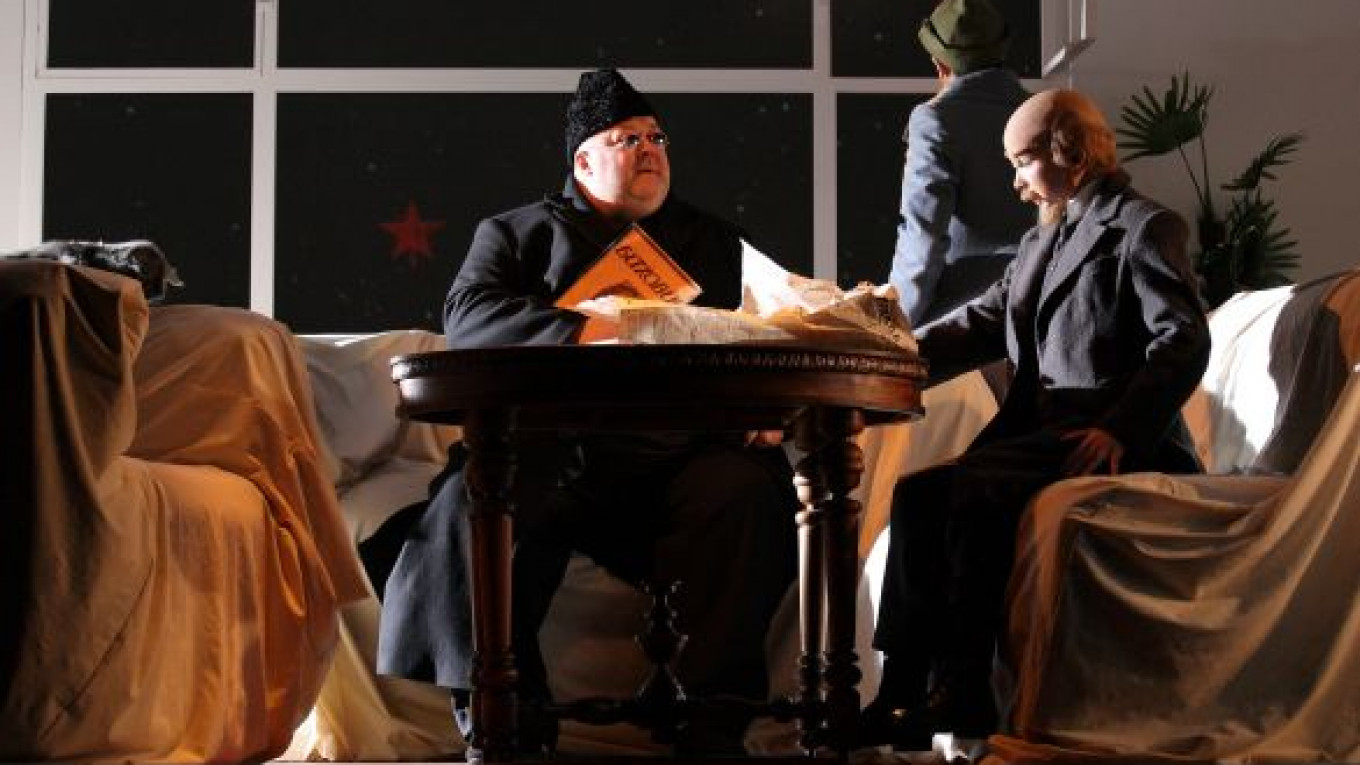Dmitry Krymov describes his new show at the School of Dramatic Art as "lessons in Russian literature." The title is "Gorki-10," a reference to the place 10 kilometers south of Moscow where Vladimir Lenin lived out the final months of his life. The result — as you would expect from Krymov — is unlike anything you would expect.
All of Krymov's shows are the creations of a painter and graphic artist — he was a set designer for the first half of his career and has been an accomplished painter his entire adult life. But "Gorki-10," which offers snippets of plays by celebrated Soviet playwrights Nikolai Pogodin, Viktor Rozov, Vsevolod Vishnevsky and Boris Vasilyev, is the first time I have seen him expose his artistic roots so bluntly.
The show begins as a panel is removed from a large hole in a wall blocking the stage to reveal a framed, living picture. Lenin sits in an armchair. Felix Dzerzhinsky, the head of the secret police, stands behind him. Action ensues that one is tempted to label nonsense. At least let's say this: By the time Act 1 concludes, all action has degenerated to nonsense. The same scene is repeatedly re-enacted, each instance growing increasingly bizarre.
Parody is what nature uses to kill off ideas and styles whose time has come and gone. In "Gorki-10," Krymov seems to be intent on killing off a large chunk of old Soviet drama.
Act 1 consists of a single scene from Nikolai Pogodin's bombastic Lenin-themed play "The Kremlin Chimes." Originally written in 1941 about the Russian Civil War period, it was one of three plays in which Pogodin did the bidding of the Kremlin by attempting to create the "proper image" of Lenin for the stage. In Krymov's interpretation Lenin begins as a mystery and ends up as a manic cartoon character.
We observe Lenin as he receives an engineer who has been asked to advise on where the Soviet government might build three electric power plants. But there is something grossly wrong with this picture. Dzerzhinsky is itching to beat someone up. Lenin cuts paper doilies out of a newspaper. A dead cat is flung out a window. Lenin's wife Nadezhda Krupskaya transforms into Lenin, who drags a corpse out of a closet, cheerfully stating, "Don't worry about that. The country is big!"
All of this is played out, thanks to designer Maria Tregubova, as if it were a nightmarish portrait hanging on a living room wall. It's the kind of picture your parents once wanted guests to see, but now it has come to life and gone berserk.
Mikhail Umanets turns in subtly off-center performances as Lenin and Dzerzhinsky. Alexander Anurov provides gripping performances of the visiting engineer and of Krupskaya — it is impossible to say whether his interpretations of these characters are primarily hilarious or devastating.
The piece de resistance is Maria Smolnikova's absolutely frenzied Lenin in the scene's finale. Her high-pitched voice, her scattershot diction and her flailing, herky-jerky gestures surely are enough to finally put Lenin to rest — at least on the theatrical stage.
Act 2 transforms us to another place altogether — a single scene that is a melange of scraps from Rozov's "In Search of Happiness," Vishnevsky's "Optimistic Tragedy," Vasilyev's "The Dawns Are Quiet Here" and a pinch of Alexander Pushkin's "Boris Godunov."
The story here is pulled out of the picture frame, deviously encouraging us to wonder if this segment will be more lifelike. Lifelike or not, the tale tips into the absurd as a squad of women is senselessly sent to death at war, and then the members of a family are shot one by one because a woman passing by accused someone of stealing her wallet.
On one level it is funny and touching — the violence is always handled in a humorous or sentimental manner. On another it is deeply distressing. The atmosphere of pointless death and random mayhem is palpable all the way from the stage to the back of the hall.
I hesitate to call "Gorki-10" beautiful, although the visual aspect is arrestingly attractive. It even entertains at times, as scene transitions are handled with songs and dances. But this is a portrait of a world gone disturbingly wrong.
As to whether it succeeds in burying some bad old plays, I'm left with question marks. It may be drawn from stories over half a century old, but you get the feeling this all is happening in the here and now.
"Gorki-10" plays March 28 and 29 at 7 p.m. at the School of Dramatic Art, located at 19 Ulitsa Sretenka. Metro Sukharevskaya. Tel. 632-9377. . Running time: 2 hours, 50 minutes.
A Message from The Moscow Times:
Dear readers,
We are facing unprecedented challenges. Russia's Prosecutor General's Office has designated The Moscow Times as an "undesirable" organization, criminalizing our work and putting our staff at risk of prosecution. This follows our earlier unjust labeling as a "foreign agent."
These actions are direct attempts to silence independent journalism in Russia. The authorities claim our work "discredits the decisions of the Russian leadership." We see things differently: we strive to provide accurate, unbiased reporting on Russia.
We, the journalists of The Moscow Times, refuse to be silenced. But to continue our work, we need your help.
Your support, no matter how small, makes a world of difference. If you can, please support us monthly starting from just $2. It's quick to set up, and every contribution makes a significant impact.
By supporting The Moscow Times, you're defending open, independent journalism in the face of repression. Thank you for standing with us.
Remind me later.







